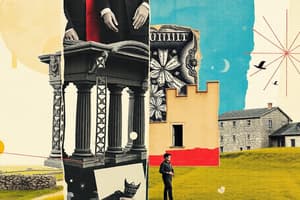Podcast
Questions and Answers
What is the primary benefit of oral histories in historical studies?
What is the primary benefit of oral histories in historical studies?
Why is it important to evaluate the reliability of sources in historical research?
Why is it important to evaluate the reliability of sources in historical research?
How does historical understanding change over time?
How does historical understanding change over time?
What role does historical analysis play in society?
What role does historical analysis play in society?
Signup and view all the answers
What must historians do to address present-day biases in their work?
What must historians do to address present-day biases in their work?
Signup and view all the answers
What is the primary focus of history as a discipline?
What is the primary focus of history as a discipline?
Signup and view all the answers
Which type of source provides firsthand accounts of the past?
Which type of source provides firsthand accounts of the past?
Signup and view all the answers
Contextualization in historical study is essential for:
Contextualization in historical study is essential for:
Signup and view all the answers
What does sourcing involve in historical research?
What does sourcing involve in historical research?
Signup and view all the answers
Which period includes the examination of major social and political changes leading into modern times?
Which period includes the examination of major social and political changes leading into modern times?
Signup and view all the answers
Which of the following is NOT a specific theme of historical studies?
Which of the following is NOT a specific theme of historical studies?
Signup and view all the answers
What kind of materials can historians use to gather evidence about the past?
What kind of materials can historians use to gather evidence about the past?
Signup and view all the answers
Which historical period is characterized by the development of industrialization and political revolutions?
Which historical period is characterized by the development of industrialization and political revolutions?
Signup and view all the answers
Study Notes
Introduction to the Study of History
- History is the study of past events, particularly in human affairs.
- It encompasses a wide range of topics, from the development of civilizations to the daily lives of individuals.
- Historians utilize various sources to reconstruct and interpret the past.
- Historical narratives are often influenced by the historian's perspectives and the available evidence.
Historical Methodologies
- Historians employ a systematic approach to research and analysis.
- Primary sources are firsthand accounts of the past, such as letters, diaries, and official documents, providing important insights.
- Secondary sources analyze and interpret primary sources, offering contextualizing information. Examples include books, scientific studies, and articles.
- Sourcing involves critically evaluating the authenticity and reliability of sources.
- Contextualization is crucial in understanding the events of the past situated within their relevant circumstances and environment.
- Historical analysis requires a discerning mind that can both connect events and critique them within their specific context.
Key Historical Periods and Themes
- Antiquity encompasses ancient civilizations like Egypt, Greece, and Rome, and relevant civilizations across the globe, including the development of writing systems.
- Medieval history covers the Middle Ages, characterized by social, political, and religious developments.
- Early modern history examines the transition to modern societies, encompassing significant events and developments leading into modern times.
- Modern history focuses on the development of the modern world from the 18th century onwards, including the rise of industrialization, political revolutions, and global interactions.
- Specific themes include political history, social history, economic history, intellectual history, cultural history, and environmental history, each contributing to a holistic understanding of the past.
Historical Sources and Evidence
- Historians use an array of materials, including written documents, oral histories, archaeological remains, and material culture, each possessing its own strengths and potential biases to understand the past more accurately.
- Written sources offer direct insights into the minds of individuals and societal structures.
- Archaeological discoveries shed light on material culture, daily life, and societal structures.
- Oral histories provide insights into people's experiences that may not be documented elsewhere.
- Visual representations (paintings, photographs) and sounds (audio recordings) offer deeper insights into societies and cultures of the period.
- Evaluating the reliability and biases of sources is vital to establishing historical accuracy.
Challenges and Perspectives in Historical Studies
- Different interpretations of the past often arise based on conflicting evidence or different perspectives.
- Historical understanding evolves over time as new evidence emerges or interpretations change.
- Historical research can be impacted by present-day biases and perspectives which must be consciously addressed.
- Historical analysis needs to be aware of the diverse experiences and viewpoints across different populations.
- Historians must engage in continuous self-reflection to mitigate bias and promote understanding.
Importance of Historical Study
- Learning from the past offers valuable insights for the present and future.
- Studies of history allow for a better understanding of social, political, and economic forces at play.
- Historical analysis encourages critical thinking and the development of nuanced perspectives regarding past and present events.
- Studying history facilitates a deeper appreciation for cultural diversity and the complexity of human societies.
- The study of different historical periods also provides insights regarding current challenges and potential solutions to contemporary issues.
Studying That Suits You
Use AI to generate personalized quizzes and flashcards to suit your learning preferences.
Description
This quiz explores the fundamentals of history and its methodologies. It covers the significance of primary and secondary sources as well as the historian's role in interpretation. Test your understanding of how historical narratives are constructed and the importance of context in the study of history.




